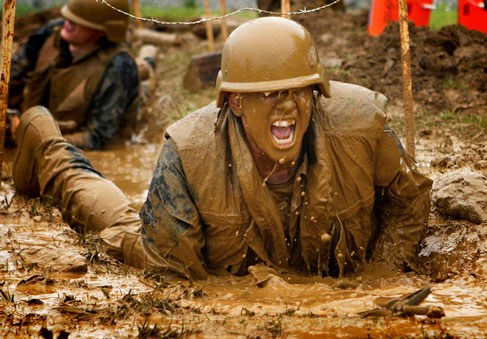Most people believe that talent and ability primarily enable peak performance and achievement. Emerging research shows that “grit”—a combination of effort and interest—also can predict success across a variety of domains, above and beyond your talents and skills. But what is grit? And is it possible to get more of it?
Grit is a psychological trait that shares some features with hardiness and mental toughness. It’s often compared to one’s ability to “suck it up and drive on” amid difficult situations. But grit is more than just your ability to plow ahead. It’s defined primarily as persistence or your ability to endure and carry on in the face of challenges and adversity. An additional facet of grit is consistency of interest or passion. Gritty people often are intensely committed to top-level personal goals for what they want to accomplish in life.
Why does grit matter?
Warfighters already might be able to envision what those with grit might look like in terms of their attitudes and behaviors. Gritty people don’t give up easily in the face of setbacks. They set goals, work hard, and stick with things until they achieve their desired end. Those who are high in grit aren’t easily distracted by new ideas and projects, and their interests remain stable from year to year.
Some research suggests that grit might be a factor in performance, especially during stressful, challenging, and demanding events. Grit can predict academic achievement in college students and adults. It also has been shown to predict retention of cadets at the U.S. Military Academy (USMA) through their first year of grueling training and schoolwork. Grit might be able to predict how much effort and time someone is willing to commit to physical exercise as well.
How can I get more grit?
Some grit can be accounted for by your genetics and personality, but you still can work toward getting grittier. Try these strategies to boost your grit.
- Practice, practice, practice. You can grow your capacity to perform difficult tasks and develop your skills by practicing things in a disciplined manner. Practice like you mean it by engaging in focused and deliberate efforts to shore up weaknesses and make gradual progress every day.
- Find (and remind yourself) of your purpose. When what you do every day fits your interests, you’re likely to feel more engaged and satisfied, perform better, and stay at your job longer than those whose interests aren’t aligned. That might seem like an obvious connection, but even if your everyday duties aren’t exactly what you’re interested in, find ways to fuel your internal motivation. Ask yourself, “Why does this matter to me, and how does it matter to others and the world around me?”
- Build optimism. Cultivating optimism enables you to remain hopeful in the face of inevitable setbacks. Try to think of one of the grittiest people you know. Whether the person is an athlete, Warfighter, or someone in your family, you might notice that he or she worked through roadblocks by maintaining hope. Try to accurately attribute the causes of your successes and failures too. And know that even though you might not be where you want yet, there still are many opportunities ahead to get there.
The bottom line
Grit is a psychological factor that can contribute greatly to your chances of achieving success, and it can help you handle things and remain passionate in the face of setbacks.
